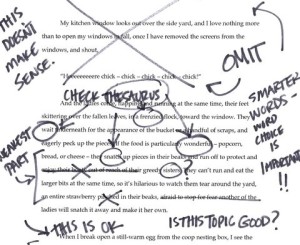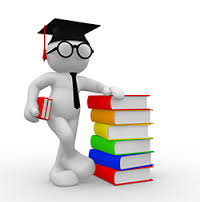Q: At what point does a consultant step back and let the student take the reins?
A: At the moment they enter the session.
We, as writing consultants, are often expected by graduate students to be their editors. We cannot let ourselves fall into this trap. This will not help these students grow to be the writers they feel like they should be or help them accomplish their goal of completing a thesis, project, or dissertation. The primary issue being addressed here is that we may find ourselves so comfortable with our students that we can sometimes forget that they are the ones who are doing the writing. How do we avoid this predicament?
Perhaps the answer to this question can be summed up in one word—listen.

In my three years of experience as a Graduate Writing Consultant I have found that when I’ve been listening too much to my own voice, during a consultation, I know I must immediately stop talking. At this point, we, as consultants, need to stop and ask them how they would go about fixing the sentence, or paragraph, or entire first chapter. We are not the end-all-be-all and, on top of that, I’ve found that the students, with whom I’ve worked, often have a more interesting voice than my own. All writing consultants, and/or tutors, should stop themselves if they have talked longer than 10 seconds and ask questions that lead the students to their own conclusions, which will give them time to have their own moment of realization. I have found that these pauses are very important.
On a personal note, I was rarely given my own amount time to think and come up with my way of learning/retaining information. This was often the case as a high school student and especially as an undergrad. I didn’t figure out how to solve mathematical equations on my own until I took the CBEST test. I had a moment of realization during that seemingly unending time frame when I suddenly learned my way to solve math problems—by drawing. All students have subjects with which they struggle. When it comes to writing, I find myself comfortable. Yes, I may know how to construct a sentence, but how can I help a person who is uncomfortable with the written word become comfortable? They need a guide to help them find their way of writing.
One way of teaching a child to swim is to throw them into a body of water without telling them what to do. This may seem sudden and cruel, but the child has seen the water, has probably seen others swim, is probably being thrown in by a person with whom she/he is familiar, etc. The child, mid-air, is subconsciously evaluating the situation, and is  searching their biological instincts to find a way to survive the experience. They also trust that, if they fail, they will be saved. Throw the student in, but be there to save them from drowning. Grammar, logical continuity, syntax, research, outlining, the drafting process, and other processes have been a part of every graduate student’s life at some point—this is their pool of water. They may not have the vocabulary to explain these things and they may not know how to explain the functions of language on the page—they may not know that they already know how to swim—but they have been exposed enough to paddle their way to safety.
searching their biological instincts to find a way to survive the experience. They also trust that, if they fail, they will be saved. Throw the student in, but be there to save them from drowning. Grammar, logical continuity, syntax, research, outlining, the drafting process, and other processes have been a part of every graduate student’s life at some point—this is their pool of water. They may not have the vocabulary to explain these things and they may not know how to explain the functions of language on the page—they may not know that they already know how to swim—but they have been exposed enough to paddle their way to safety.
 Students often get caught up in sounding scholarly. When encountering this, try to ask them, “How would you write this sentence?” Often, after they have let go of that Jiminy Cricket on their shoulder who is telling them that they need to write to a scholarly audience, they dismantle the facade and rewrite the sentence in their own authoritative voice. These students haven’t quite learned that they have already become the scholars and they definitely do not trust themselves. How do we show them how to trust themselves? We ask them to explain the subject in their own words. We should listen, ask, and then listen again. They have the tools and a constructivist approach would assume that they would find their way. A consultant should say “there is the pool,” throw them, in and be the “life jacket” in case the student flounders. Nine times out of 10, the student will find their way toward a clear, scholarly, voice that belongs to them.
Students often get caught up in sounding scholarly. When encountering this, try to ask them, “How would you write this sentence?” Often, after they have let go of that Jiminy Cricket on their shoulder who is telling them that they need to write to a scholarly audience, they dismantle the facade and rewrite the sentence in their own authoritative voice. These students haven’t quite learned that they have already become the scholars and they definitely do not trust themselves. How do we show them how to trust themselves? We ask them to explain the subject in their own words. We should listen, ask, and then listen again. They have the tools and a constructivist approach would assume that they would find their way. A consultant should say “there is the pool,” throw them, in and be the “life jacket” in case the student flounders. Nine times out of 10, the student will find their way toward a clear, scholarly, voice that belongs to them.
Ronald Dzerigian
 Academic conferences in your field of study are valuable (and often initially intimidating) scholarly experiences. Since I am preparing to attend a conference next month, I’ve compiled a series of tips for applying to, getting to, and presenting at graduate and undergraduate conferences.
Academic conferences in your field of study are valuable (and often initially intimidating) scholarly experiences. Since I am preparing to attend a conference next month, I’ve compiled a series of tips for applying to, getting to, and presenting at graduate and undergraduate conferences.

 Conference Etiquette
Conference Etiquette This week I am going to feature two of our amazing writing consultants and their thoughts on the best use of time and managing life during the writing process. We are losing Katy as she is moving on to a job in her field of study and expertise, but Scott will be back to discuss his ideas further in a continuing series. First up, Katy Hogue:
This week I am going to feature two of our amazing writing consultants and their thoughts on the best use of time and managing life during the writing process. We are losing Katy as she is moving on to a job in her field of study and expertise, but Scott will be back to discuss his ideas further in a continuing series. First up, Katy Hogue: 
 By Scott Trippel, Graduate Writing Consultant
By Scott Trippel, Graduate Writing Consultant spending 3 hours in the middle of the night, try sleeping, wake up refreshed, and get your paper done in 1 hour. I found a lot of advice about sleep hygiene online, one of the best comes from the University of Michigan Health System. You can find it here.
spending 3 hours in the middle of the night, try sleeping, wake up refreshed, and get your paper done in 1 hour. I found a lot of advice about sleep hygiene online, one of the best comes from the University of Michigan Health System. You can find it here.
 A great deal of students we see at the Graduate Writing Studio are completing degrees in psychology, nursing, and physical therapy. While health-centric disciplines may not be popularly associated with writing, the GWS can offer guidance on literature reviews, case reports, evidence-based papers, and any other written projects. In a 2013 evaluation of its own writing center, the Medical University of South Carolina found “that nearly all students who used the Center agreed (and most strongly agreed) that it met their needs” and use of the Center was “associated with a better written product” (Ariail et al. 132).
A great deal of students we see at the Graduate Writing Studio are completing degrees in psychology, nursing, and physical therapy. While health-centric disciplines may not be popularly associated with writing, the GWS can offer guidance on literature reviews, case reports, evidence-based papers, and any other written projects. In a 2013 evaluation of its own writing center, the Medical University of South Carolina found “that nearly all students who used the Center agreed (and most strongly agreed) that it met their needs” and use of the Center was “associated with a better written product” (Ariail et al. 132). The quiet is deafening. Students have gone home for the holiday break and the Graduate Writing Studio is, for the most part, empty. It is a time for reflection and looking toward next semester. Here are some things to look forward to:
The quiet is deafening. Students have gone home for the holiday break and the Graduate Writing Studio is, for the most part, empty. It is a time for reflection and looking toward next semester. Here are some things to look forward to:














